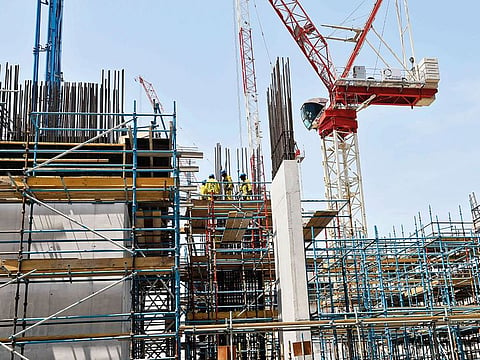UAE developers feel full weight of steel and container rate surge, leading to delays: Danube MD
Steel and other building material prices have rocketed, adding to developers' cash burn

Dubai: Ongoing projects in the UAE are getting hit as the cost of importing steel and other vital building materials see further sharp increases. If this escalation continues, it could lead to project delays as developers wait for material prices to cool off.
Or they might just have to pass it down, which will add to the cost of buying property.
“In the last two weeks or so, I have seen developers hold off projects,” said Anis Sajan, Managing Director at Danube Group, which is into property development as well as building material supplies. “They are not buying materials because they cannot absorb a further cost hit.
“Steel sales are just not happening - contractors are not willing to pay more than Dh2,500-Dh2,600 a tonne. Delays will be the natural outcome.”
Squeeze on new homes?
If delays stretch to two or three months, it could drastically bring down the number of new properties being delivered. At the start of the year, forecasts were suggesting around 40,000 new homes will be delivered in Dubai this year, against 30,000 plus units in 2020.
“If a project costs Dh200 million and steel prices are going up by 30 per cent, it affects developer costs by 2 per cent,” said Sajan. “That’s already quite high for any developer. Anything above this, developers won’t be able to take the hit any further – they will pass it down.”
Supply issues
While rising import prices have been a reality since November last, the sharp turn since the beginning of this year caught developers and the trade quite by surprise. And this time, it’s not just about delays happening at ports in China.
Container rates from China are now hovering at $4,000 per TEU and even shot up to $5,000 at one port. That’s against $1,2000-$2,000 per TEU range last year. The first shipments of construction supplies have already arrived at UAE ports at these costs.
The same is happening with container rates on routes from India – a 40-foot container that cost $300-$350 is now firmly perched at $1,600. Plus, even at these rates, there aren’t enough containers available. “Often, as the importer, we had to arrange for the container rather than have the supplier do it,” said Sajan. “India is worst affected as far as container availability is concerned.
“The way China and India container rates have shot up in such a short span is unprecedented. To my knowledge, it’s the first time container rates have reached these levels. They have just gone berserk.”
Happening all over
When it comes to container shipments from Europe, rates are now at $1,500-$2,000 against $1,000 a TEU last year. And there’s another problem as well – suppliers are diverting shipments to the US because they are getting market prices there. According to Sajan, the most affected commodity because of this diversion is white wood, which has seen prices head up to $260 per cubic metre from $190.
“Until December, importers could sustain some loss from higher freight charges rather than pass it on to the buyer,” the Danube official added. “But it has reached a stage where they have no choice but to hike their end-user prices, either to the developer or to the trader.
“Container charges have gone up by about 20 per cent and import charges by 15 per cent.”
Feeling the pinch
For developers intent on saving each dirham if they can, the hike in building material prices are proving a burden. Industry sources say it’s only a matter of time before offplan property prices reflect this. This comes with inherent risks.
“It will be difficult to convince property buyers that an increase is justified because of higher project costs,” said one developer source. “They will just seek out already built homes, which obviously aren’t affected by building material price rise.”
As such, the trend in the Dubai property market is in favour of ready homes.
Sign up for the Daily Briefing
Get the latest news and updates straight to your inbox






